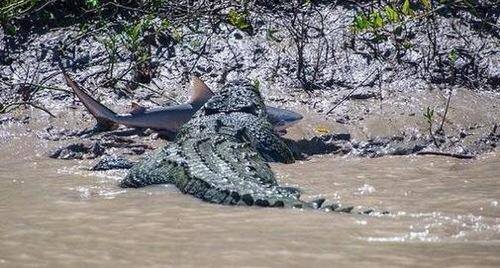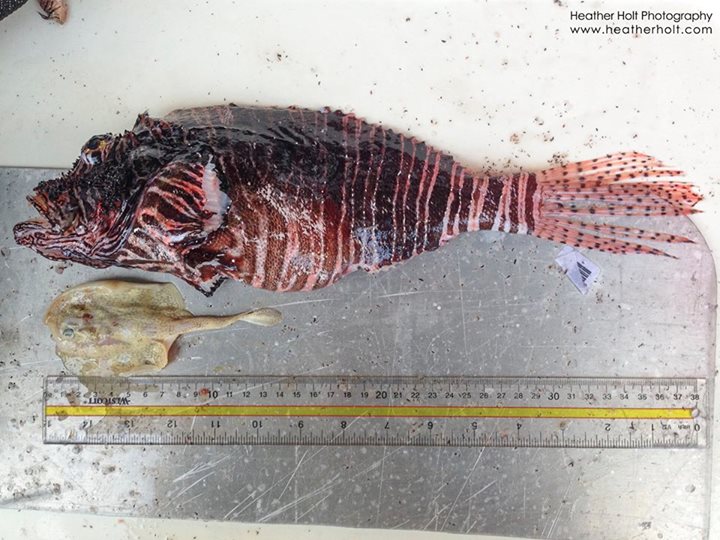Most people think of sharks as being apex predators, large, fearsome hunters sitting right at the top of the ocean food chain. Of course, that isn’t always the case. There are more than 500 known species of sharks, and they vary in size from the size of a pencil to the size of a school bus. In many cases, there’s a larger predator in their environment, which can lead to some surprising and amazing interactions.
A crocodile ate a bull shark
Brutus, a famous crocodile in Australia, was recently photographed eating a juvenile bull shark. Southern Fried Science writer Sarah Keartes has the full story at EarthTouch.

An osprey ate a bonnethead shark.
Florida real estate agent Dragana Connaughton loves birds of prey like ospreys, and goes to the beach regularly to photograph them. This photo, taken right after Hurricane Sandy, is her all time favorite. “I have never seen a baby bonnethead shark before, and no less one that ended up in the talons of the osprey for his evening meal,” she told me.

A sea lion ate a leopard shark.
People think of pinnipeds as being great white shark prey, but they’ve been known to eat smaller sharks like leopard sharks.
httpv://www.youtube.com/watch?v=rhtyzBQcNJc
An octopus ate a dogfish
Though this famous example took place in an aquarium, there’s no reason to suspect it couldn’t also happen in the wild
httpv://www.youtube.com/watch?v=FFOEZh1Lbbg
A moray eel tried to eat a whitetip reef shark
Moray eels can grow pretty large, and they have an incredibly strong bite force. It’s not surprising that they sometimes try (and in this case fail) to eat medium-sized fish like whitetip reef sharks.
httpv://www.youtube.com/watch?v=D05_z1h8uMs
A goliath grouper ate a blacktip shark.
This recent example has gotten tons of press coverage, but doesn’t surprise those of us lucky enough to have seen these giant and endangered fish in the wild.
httpv://www.youtube.com/watch?v=O37HI_AX9nY
Bonus: a lionfish ate a stingray
Lionfish are perhaps the most famous, or infamous, invasive species in the world. Native to the Info-Pacific, they are now common throughout the Caribbean and Western Atlantic. They’re causing ecological problems by outcompeting native fish for food or directly consuming native fish. This week, though, scientists discovered a new animal inside the stomach of a lionfish killed during the Cayman United Lionfish League tournament in the Cayman Islands: a yellow stingray, close relatives of sharks.

A great deal of conservation advocacy for sharks stresses that they are ecologically important because of their role as predators. This is true for many species, but others are ecologically important because of a role not often considered for sharks: prey. A more in-depth understanding of shark ecology will lead to an even greater appreciation of their importance to the marine environment.
“A more in-depth understanding of shark ecology will lead to an even greater appreciation of their importance to the marine environment.”
Well said, David. There are a lot of misconception on sharks and unfortunately those with the least knowledge make the most noise.
Here is the link to my new piece :
http://www.eurasiareview.com/27082014-western-hypocrisy-sharks-fin-debate-analysis/